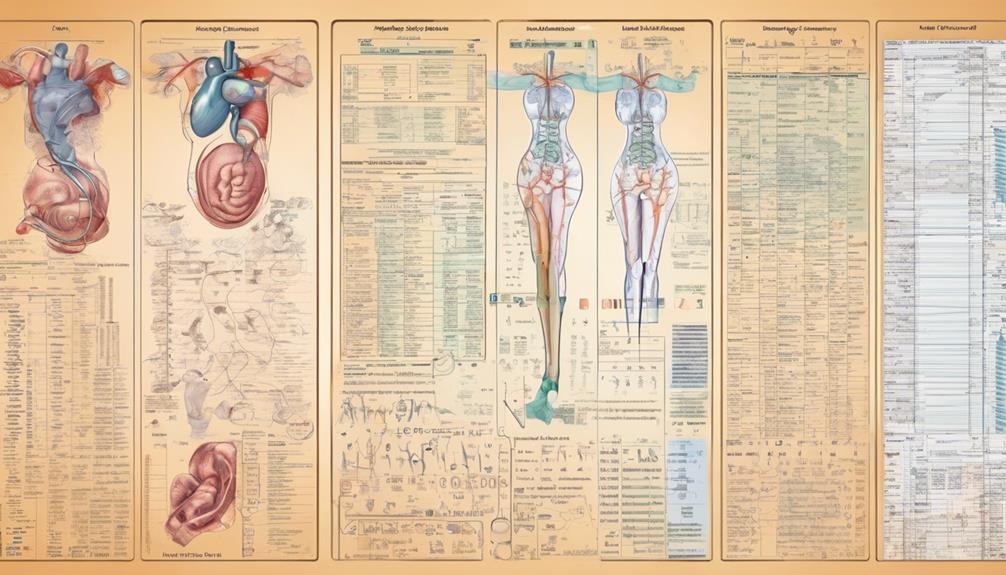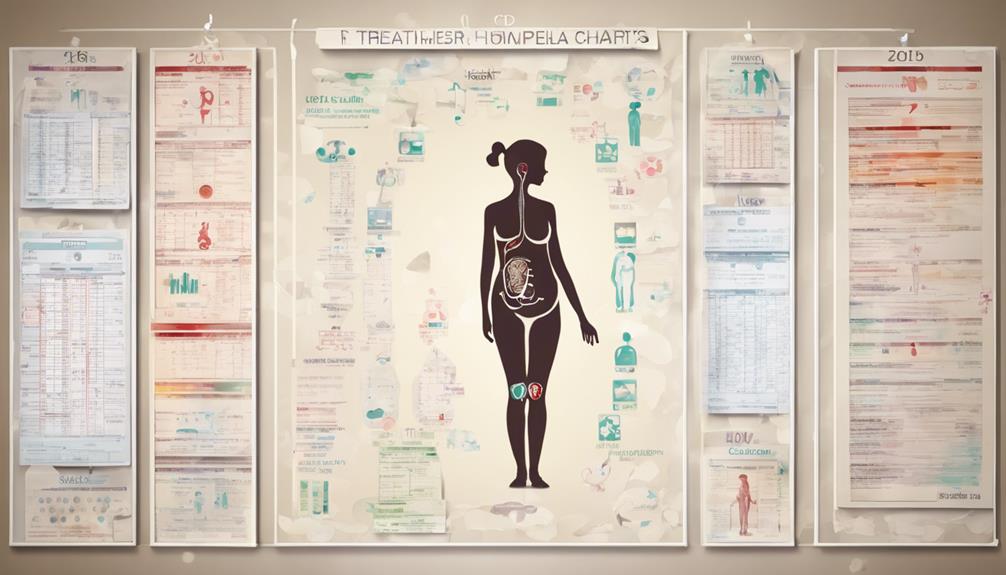As healthcare providers, we frequently encounter difficulties during the initial stages of pregnancy more commonly than anticipated.
Did you know that approximately 10-25% of recognized pregnancies end in miscarriage during the first trimester?
Understanding the ICD codes related to these complications is crucial for accurate diagnosis and treatment.
Let's explore the nuances of these codes and their implications for maternal health outcomes and effective healthcare management.
Key Takeaways
- ICD codes aid in tracking and managing first trimester complications accurately.
- O Codes detail specific conditions like severe vomiting and hypertension in pregnancy.
- Z Codes document routine care for normal pregnancies in the first trimester.
- Following coding guidelines ensures precise reporting and improved maternal care outcomes.
Importance of ICD Codes in Pregnancy
Understanding the significance of ICD codes in pregnancy is essential for accurately documenting and tracking maternal health conditions during the first trimester. Proper utilization of ICD-10 codes not only aids in reimbursement for healthcare services provided during this critical period but also plays a vital role in identifying high-risk pregnancies that require targeted interventions and specialized care. By coding first trimester complications accurately, researchers can analyze data to improve maternal care protocols, leading to the development of evidence-based guidelines that enhance overall maternal health outcomes.
The meticulous application of ICD-10 codes for first trimester pregnancy complications serves as the foundation for effective data analysis and research in the field of maternal health. This precision guarantees that healthcare providers have access to thorough information that enables them to deliver top-notch care to pregnant individuals, especially those facing complications early in their pregnancies. Ultimately, the integration of ICD codes into maternal care practices fosters a more informed and proactive approach to addressing the diverse needs of expectant mothers during the first trimester.
Common First Trimester Complications Codes

Shifting to the discussion of common first trimester complications codes, we emphasize key ICD-10 codes that play an important role in identifying and managing pregnancy-related issues early in gestation.
For severe vomiting in pregnancy during the first trimester, healthcare providers use O21.0. This code helps track and address the challenges associated with this condition.
Pre-existing hypertension complicating pregnancy in the first trimester is denoted by O20.0, aiding in the monitoring and treatment of high blood pressure in expectant mothers.
Additionally, O26.40 is utilized for pre-existing diabetes mellitus complicating pregnancy in the first trimester, enabling healthcare professionals to manage this complex situation effectively.
Excessive weight gain during the first trimester is coded as O26.71, while gestational edema with proteinuria in this period is represented by O26.82.
Familiarity with these ICD-10-CM Diagnosis Codes is essential for healthcare providers to provide thorough care for pregnant individuals experiencing these specific first trimester complications.
Understanding O Codes for Pregnancy
Utilizing ICD-10-CM O codes is crucial for categorizing and addressing pregnancy complications, particularly those related to the first trimester. O26.891 is a specific code designed for other specified pregnancy-related conditions occurring during the first trimester, applicable to maternity patients aged 12-55 years. This code specifically targets maternal disorders and became effective from October 1, 2023. The first trimester, defined as less than 14 weeks of pregnancy, is a critical period requiring accurate diagnosis and management of pregnancy complications.
| ICD-10-CM Code | Description |
|---|---|
| O26.891 | Other specified pregnancy-related conditions in the first trimester |
| Applicable to maternity patients aged 12-55 years | |
| Effective from October 1, 2023 | |
| Falls under Maternal Disorders chapter in ICD-10-CM | |
| Emphasizes conditions mainly related to pregnancy |
Z Codes for First Trimester Care

When documenting first trimester care, Z codes, such as Z34.91, play a critical role in indicating normal pregnancy supervision without encompassing pregnancy complications or high-risk pregnancies. These specific Z codes, designed for encounters related to non-disease circumstances influencing health status, are essential for accurately documenting the care provided to maternity patients in the first trimester.
Z34.91, a billable ICD-10-CM code effective from October 1, 2023, is particularly useful for tracking and monitoring maternal health outcomes during this important period. Utilizing Z codes like Z34.91 ensures that healthcare providers can efficiently communicate the nature of the encounter, emphasizing routine care for normal pregnancies.
Coding Guidelines for Pregnancy Complications
Effective coding for pregnancy complications in the first trimester is essential for accurate reporting and improved maternal care. In the domain of ICD-10-CM, the identification and classification of first-trimester pregnancy complications play a pivotal role in ensuring the well-being of both the mother and the fetus.
When assigning ICD-10 codes to document these complications, it's critical to contemplate the specific trimester, as codes for first trimester complications are categorized under chapter 15 and typically begin with the letter 'O.' Additionally, using the appropriate seventh digits in certain complication codes helps in specifying the affected fetus accurately.
To provide a thorough diagnosis, additional codes from category Z3A Weeks of gestation may be assigned to indicate the exact week of pregnancy. By following these coding guidelines meticulously, healthcare providers can effectively track trends in first trimester pregnancy complications, contributing to enhanced maternity care for pregnant females.
What Are the Most Common ICD Codes for First Trimester Pregnancy Complications?
When it comes to first trimester pregnancy complications, some of the most common ICD codes first trimester pregnancy are O21 (excessive vomiting in pregnancy), O20 (haemorrhage in early pregnancy), and O26 (maternal care for other conditions of the mother in pregnancy). These codes help accurately identify and track the frequency of these issues.
Conclusion
To sum up, precise ICD coding is vital for tracking and managing first-trimester pregnancy complications. By utilizing codes like O26.891 and Z34.91, healthcare providers can guarantee proper billing, monitor maternal health outcomes, and identify high-risk pregnancies for targeted interventions.
Understanding the significance of ICD codes in pregnancy care is critical for improving maternal health protocols and facilitating data-driven decision-making in obstetric healthcare.









